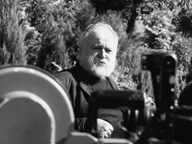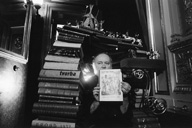Juror
Karel Vachek
 [Juror’s Statement]
[Juror’s Statement]
I am delighted, for the first time, to be visiting the country whose residents have come to love Bedřich Smetana, the composer and “musician-philosopher” whose homeland I share, and whose opera Dalibor is a thread that runs through one of my novelistic films.
One major source of inspiration for my work has been Zen Buddhist teachings (i.e., we can become one with the Universe even in our everyday activities such as washing the dishes).
In the 1960s, when I was learning the trade of cinematography, I happened to stumble upon a Czech translation of Matsuo Basho’s haiku poetry. In fact, my personal theme is also the unification of spirituality and the reality of our being. (Every human being should get to wear comfy shoes, and I pray the same for this film festival!)
Allow me now to cite one of my favorites from Master Basho:
Samurai gathering—their chat has the pungent taste of horseradish
Born in 1940, Vachek studied direction at the Prague Film Academy (FAMU) under Elmar Klos. In 1963 he shot his thesis film, Moravian Hellas, in Strážnice, then-Czechoslovakia, about the town’s traditional folk celebrations. The film’s unusual approach—blending humor and intellectual aggression—caused furor and indignation as well as admiration in official cultural and political circles. It took several years for it to be allowed to be screened publicly. As a director with the Krátký Film studio in Prague in 1968, Vachek shot the film Elective Affinities, a legendary portrait of the protagonists of the Prague Spring during the presidential elections of that year. He had to leave Krátký Film with the onset of the post-1968 “normalization” process, working in manual trades, emigrating to the USA, and then working as a driver in the 1980s after his return. After 1989, he completed an extensive film tetralogy about contemporary Czech society, of which Who Will Guard . . . is the final part. Since 1994 he has taught at FAMU in the documentary film department, becoming its head in 2002. His films and professional stance has influenced many younger artists. In 2004 he published a book, The Theory of Matter, which is an important conceptual milestone regarding his newest film, Záviš, the Prince of Pornofolk Under the Influence of Griffith’s Intolerance and Tati’s Mr. Hulot’s Holiday, or The Foundation and Doom of Czechoslovakia [1918–1992]. |
Who Will Guard the Guardman? Dalibor, or the Key to Uncle Tom’s Cabin
Kdo bude hlídat hlídače? Dalibor aneb Klíč k Chaloupce strýčka Toma CZECH REPUBLIC / 2002 / Czech / Color / 35mm / 242 min
CZECH REPUBLIC / 2002 / Czech / Color / 35mm / 242 min
Director, Script: Karel Vachek
Photography: Karel Slach
Editing: Renata Pařezová
Sound: Libor Sedláček
Production Companies: Czech Television, Negativ S.R.O.
Source: Radim Prochazka Productions, Ltd.
www.karelvachek.cz
Dalibor is an 1868 opera by Bedich Smetana, based on the life of a Czech knight who took part in an uprising in support of the oppressed people and was sentenced to death by the king. While singers rehearse at Prague’s National Theater, maverick filmmaker Vachek invites other “actors”—contemporary Czech figures representative of minority opinions—to speak to the camera, “imprisoned” within the confines of the theater space. Playing with the motifs of theater, subversive battles against establishment, and tragedy, Vachek poses a biting critique of post-1989 Czech society.
